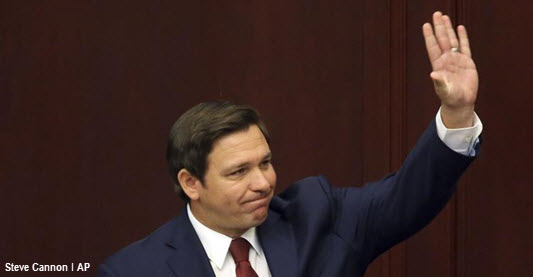DeSantis on Education: Senate School Choice Proposals May End Honeymoon With Democrats
Posted March 6, 2019 05:00 am

TALLAHASSEE – Gov. Ron DeSantis met with the convened Legislature for his first time Tuesday to spell out his goals for the coming legislative session, and if there was any doubt that Tallahassee is still in a honeymoon swoon over the new governor, it was evident in the bipartisan praise he received after his 25-minute inaugural State-of-The-State address.
Even Democrats, including Senate Minority Leader Audrey Gibson, D-Jacksonville, were calling DeSantis’ emphasis on the environment and the economy “welcome,” “on target” and good news.”
But the young and energetic new governor, fresh from an exuberating 60 days of cross-state canvassing and campaigning for his policy initiatives, may find long-entrenched battle lines in educating funding are certain to outlast the honeymoon and, eventually, result in a storm of litigation.
DeSantis spelled out educational priorities geared to sustaining the state’s high-quality ratings in secondary university/college programs and to making Florida “No. 1 in workforce education” within a decade.
But his $21.7 billion Fiscal Year 2020 education budget request, which includes an executive order to do away with “vestiges” of Common Core standards, “streamline” standardized testing and revise the state’s educational curriculum, has been countered by alternate Senate and House proposals, and with heated opposition from Democrats.
DeSantis seeks a $422.97 million revision of the “Best And Brightest" teacher bonus program and to increase the Florida Education Finance Program (FEFP) allocation by $50 million annually for the state’s 2.8 million school children.
The 2018 FEFP allocation is nearly $21.1 billion – including $9.1 billion, or 43 percent, from local district taxpayers – which breaks down to $7,429 for each of the state’s Full Time Enrolled (FTE) students. A $50 per student annual allocation would increase the FEFP by 47 cents a day.
Gibson said DeSantis is “grossly under-funding” schools because his real emphasis is on asking taxpayers “to subsidize an industry for for-profit companies. That is what the governor has laid out, that is what he is about to try to do.”
Gibson was referring to DeSantis’ plan to grow the state’s school choice program, which is funded by tax credits, with a proposed “Equal Opportunity Scholarship,” which would make students with family household incomes of up to $68,000 eligible for school choice vouchers.
Two-thirds who received the Florida Tax Credit (FTC) scholarships this year – more than 70,000 – are African American or Hispanic with an average household income of $25,756. The federal poverty guideline is $25,750 for a family of four.
Gibson said the FTC school choice program – the nation’s largest with nearly 100,000 students using public money to attend 1,800 private schools – is a “bait-and-switch scheme” designed to draw students from struggling school districts “that were purposely left behind.”
House Speaker Jose Oliva, R-Miami Gardens, said the House is receptive to creating more revenue streams to fund school choice programs “for years to come, for it to expand. Ultimately, the money should follow the child.”
He said the question is not what is better for the school system and the industry it supports, but what is better for students.
The state wants to create a scenario where “parents get to make that decision on where the child should go to school,” Oliva said. “We are not having that discussion with the school, but with the parents.”
The Senate has submitted its own “Family Empowerment Scholarship” that would expand school choice eligibility to students with household incomes of up to $67,000.
Senate President Bill Galvano, R-Bradenton, said “there is a role for traditional public schools and I would like to see us balance our approach,” but acknowledged some feel the time is right – with three new conservative judges on the state Supreme Court – to adopt a bill using public money for private school-choice vouchers.
Such a bill would spur lawsuits since it would violate a 2006 Florida Supreme Court ruling prohibiting public dollars from being used in school choice vouchers.
“I think some do” want to push a case to the Supreme Court, Galvano said, but the proposed Senate “Family Empowerment Scholarship” is only focused on driving down the waiting list for the program.
"We aren’t just taking tests here to see what survives legal challenge and what doesn’t,” he said. “It is going to be a really, really balanced package.”
Gibson said if adopted, the school choice proposals will be challenged and dismissed by the courts.
“The constitution is on our side,” she said. “We will continue to stand up and defend our children’s right to a free public school education.”
-------------------------------
This piece appeared in the Watchdog.org and was reprinted by the Columbia County Observer with permission or license.

 By
John Haughey
By
John Haughey